'If I help one dad, I've done my job'
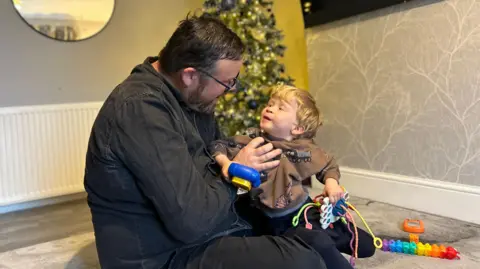 BBC
BBCA group of fathers whose babies were cared for in Hull's neonatal intensive care unit (NICU) are providing a listening ear to other men in the same situation. BBC News pays them a visit.
"The noises and the lights and everything just sticks with you," says Jon, a father-of-three and founder member of the support group Humber Dads.
"When I was going home on a night, I'd lay in bed and all I could hear was them noises and it was just the sheer, constant worry of will he be ok?"
Jon's son, Ralphie, was born nine weeks early after a terrifying warning from his partner's medical team.
He recalls: "The doctor basically said your baby needs to be born tomorrow at the very latest, otherwise there's a good probability of a still birth."
Ralphie was delivered by emergency caesarean section, weighing only 3lbs 6oz (1.5kg).
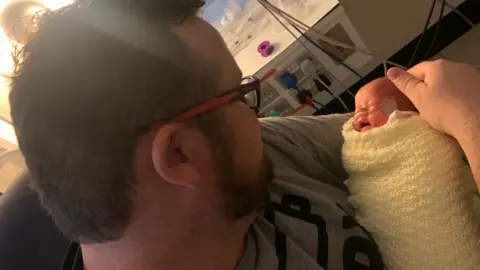 Family photo
Family photoFour years on from his family's ordeal, it is clear Jon is still haunted by the experience.
Yet he and others who had similar ordeals return to the unit, within Hull Royal Infirmary, each week to support others.
"I want them to feel like they're not alone, that there's someone to talk to, someone who understands," explains Jon.
"If I can make a difference to one dad, then I've done my job."
Although not criticising the standard of care, Jon explains dads on the unit can feel isolated and unable to share their emotions during what is often a highly traumatic period.
During Ralphie's five weeks in NICU staff would tell him and his partner to go home for rest.
For a moment, Jon is transported back to 2020.
"We'd get home and we'd have a phone call saying he's struggling with his breathing and his lips have gone purple and to get back quick," he says.
"So we're then quickly putting our clothes back on and in the car and driving like crazy back to the hospital, thinking will he be alive when we get there?"
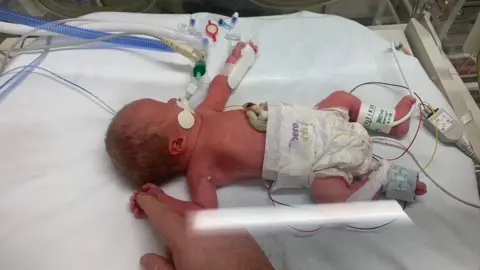 Family photo
Family photoRalphie is now a happy little boy, who Jon describes as "full of beans, a little whirlwind around the house".
His experience of spending time in the NICU inspired him to join forces with two other dads to set up a peer support group, to help other men going through the same experience.
The Humber Dads group was born, and now the members take turns to visit NICU every Monday evening.
We follow Jon on his rounds.
He catches up with Graeme, whose son Faolin was born full-term, but has already spent a month in the NICU with medical complications.
For Graeme, being able to speak to someone who knows what he is going through is a huge relief.
"When things seem dark, knowing there's other people that have been through that makes you think there are pathways out," he says.
"Knowing you're not the only person fighting through something like that kind of makes it a bit easier."
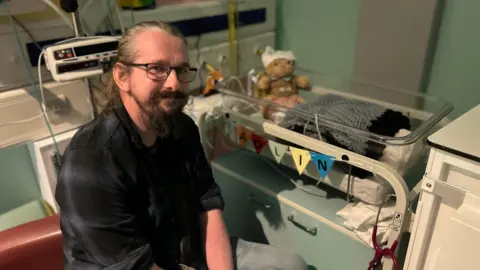
Jon describes men like Graeme as his "brothers in arms" and says there's "nothing better" than being able to help men who find themselves in the same boat as he did.
He says: "Anyone can talk to a best friend, or a mum, or a dad, or a brother or sister, but they don't know what the experience is like unless they've actually been through it themselves.
"I want to make them feel stronger mentally. Dads can get forgotten."
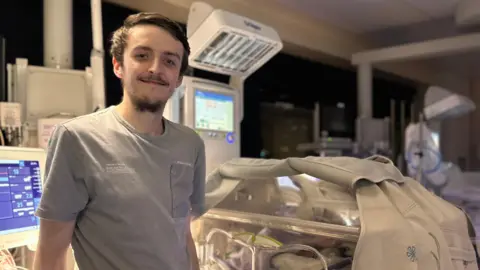
Jon moves next door to the unit's high dependency room, where he shakes hands with Rob, from Scunthorpe. His twin daughters Grace and Lily were not due until March, but were born in December, one weighing 2lb 2oz (1kg), the other only an ounce heavier.
Rob says the girls were so tiny when they were born that he was scared to hold them, but talking to Jon helped enormously.
He says: "When you come onto the NICU, everyone's on about the mum, and making sure they're OK. That's great, it's what's needed, but then you kind of feel a little bit left out, so it's nice and reassuring to know that there is people like Humber Dads out there."
NICU's clinical psychologist, Rachel Foxwell, admits the unit can be a "really difficult, isolating and lonely place" for parents, but says the Humber Dads volunteers are making a "really big difference", especially as men can be "overlooked".
She says: "Dads can often think that they need to be strong and they need to be brave to look after mum, to look after baby and they don't often give themselves the space to think about how it is emotionally for them."
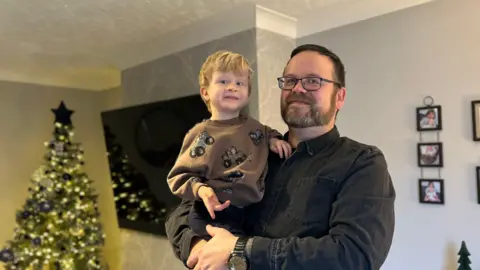
Although Jon says most conversations with dads on the unit start with babies, they often move onto subjects like football and rugby, giving dads a much-needed break from the mental stress of having a sick or premature baby.
He says: "Every dad I approach opens up. I've spoke to dads that have been very upset and then half an hour later, they've been laughing and joking with me, having a cup of tea in the kitchen.
"That for me is the buzz. If I can make a difference to one dad, when I go on there, then I've done my job."
